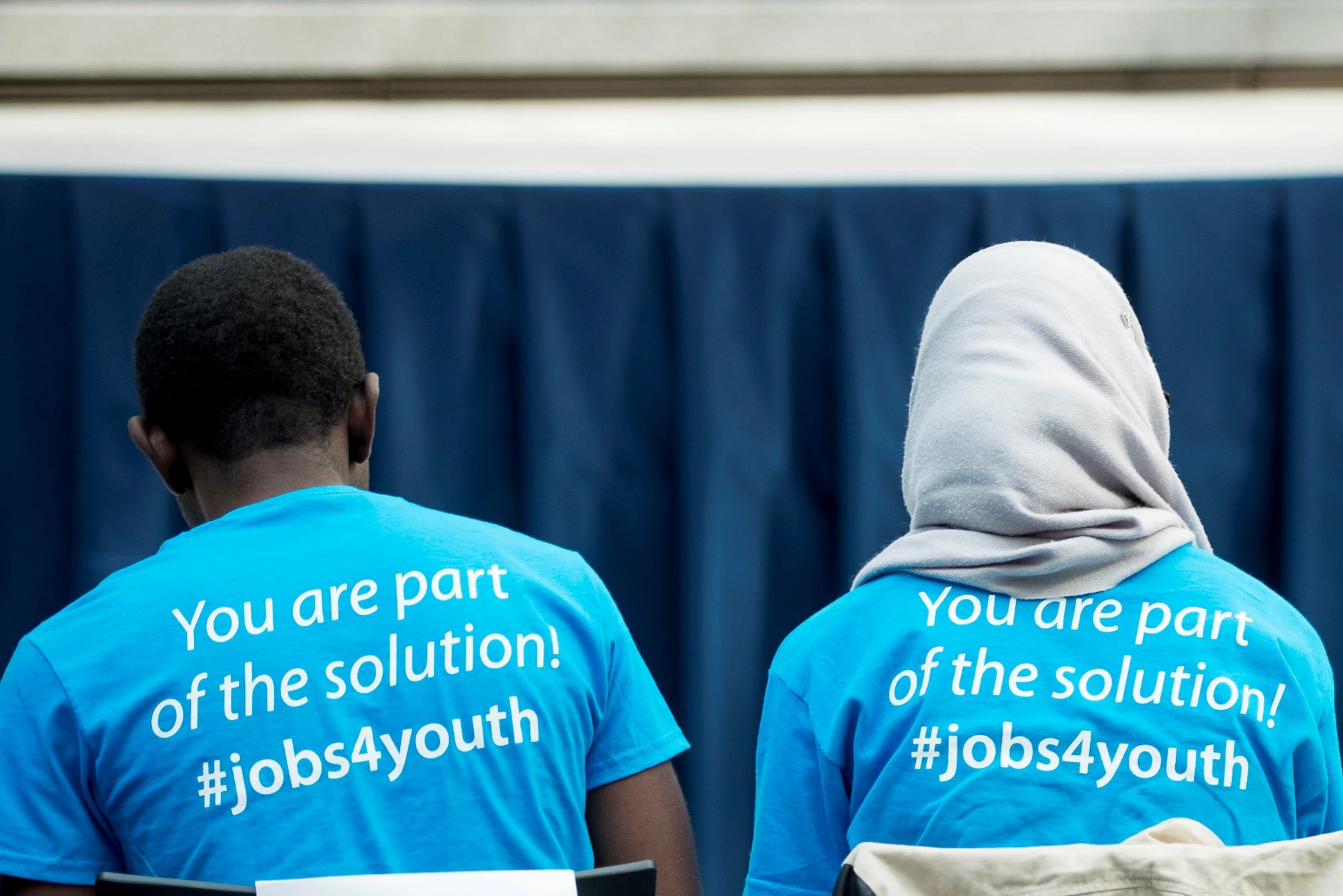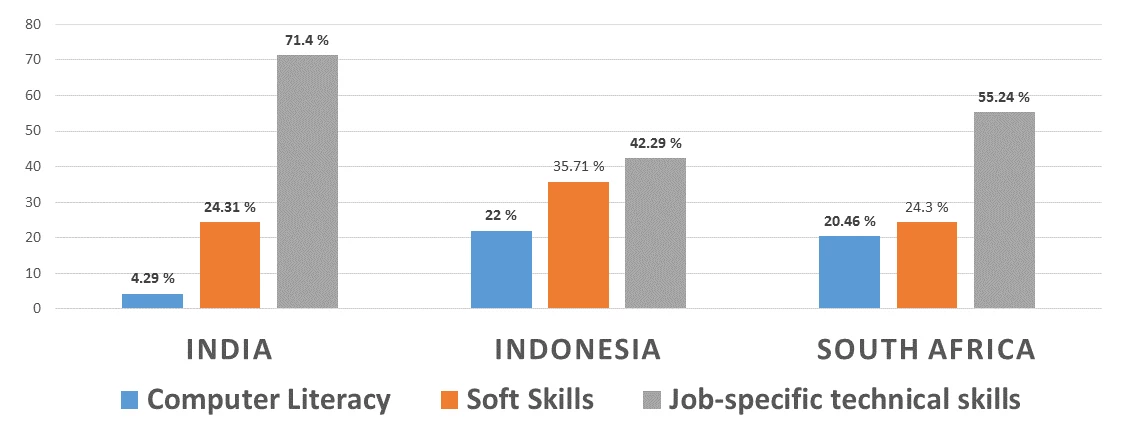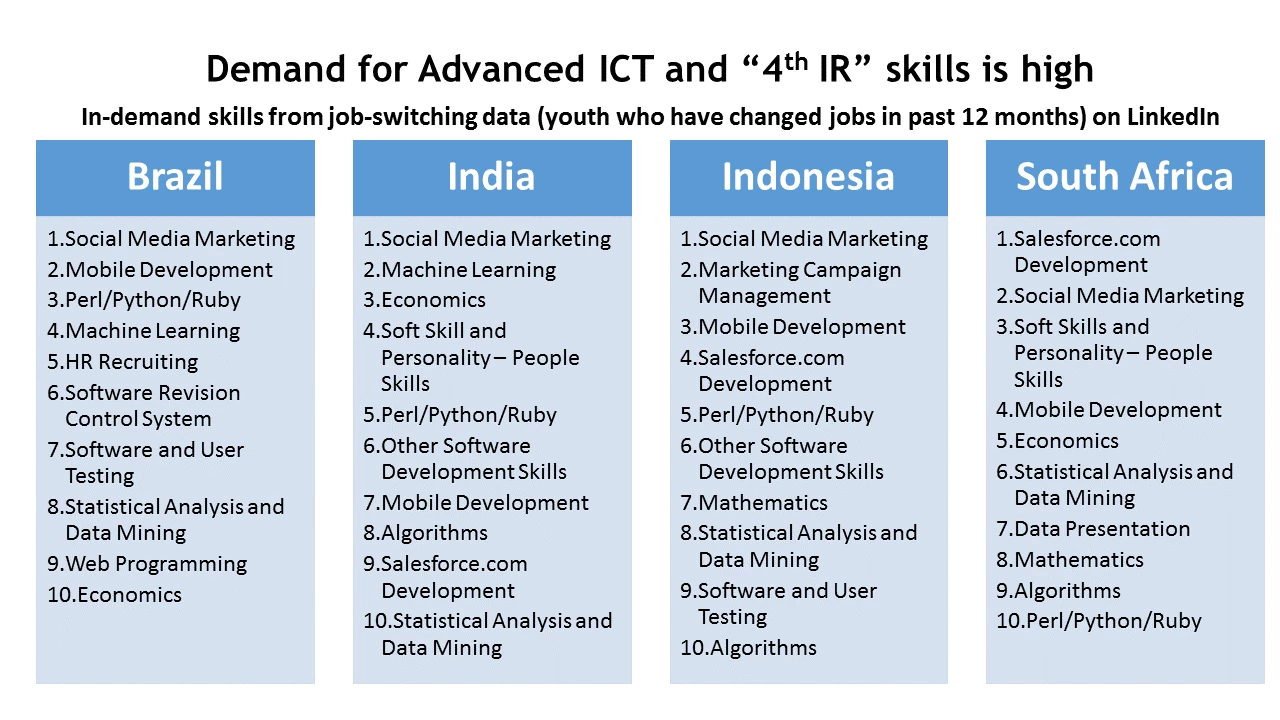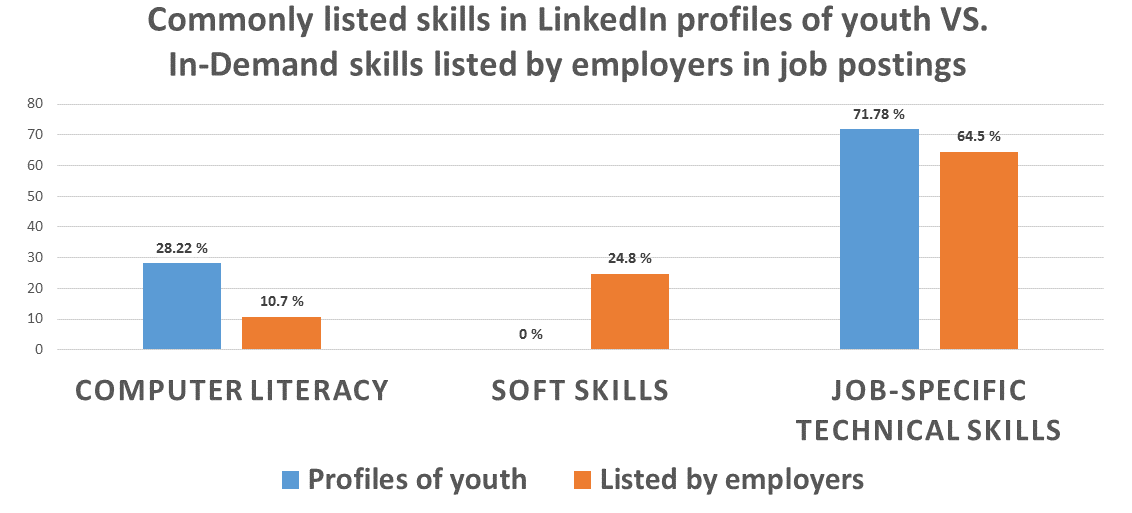
Finding a good job is increasingly difficult – especially for young people. Globally, young people are up to four times more likely to be unemployed than adults. Furthermore, the lack of opportunity can have devastating consequences for their long-term employment outcomes. Youth often lack the skills and competencies that are in high demand from employers, but they also face information gaps about which relevant skills they should signal to prospective employers.
To better understand youth and skills trends in emerging markets, the Solutions for Youth Employment (S4YE) Coalition embarked on a research collaboration with LinkedIn to analyze demand and supply side data from 390,000 entry-level job postings and 6.4 million LinkedIn profiles of young people (aged 21-29) in four diverse middle-income countries. Using big data analytics, the recently released report The Skills Gap or Signaling Gap: Insights from LinkedIn in emerging markets of Brazil, India, Indonesia, and South Africa brings the following three insights on what skills employers in those countries are looking for in youth hires.
Employers want it all – a right mix of hard, soft, and computer skills
Employers are looking for well-rounded entry-level candidates who have a combination of technical, soft, and computer skills. This means that companies want it all: the hard skills (the technical knowledge specific to the position), the so-called “soft skills” (such as teamwork, communications, and time management), and computer literacy skills (such as Microsoft Office, email). Our analysis of entry-level job postings on LinkedIn in the four countries suggests that while employers want a mix of skills, they emphasize the technical, or Information and Communications Technology (ICT), skills that are required for the job. Job-specific technical skills make up 65% of the most frequently-listed skills in job postings on the platform in India, Indonesia, and South Africa (% share among the top 20 skills in job postings). This is consistent with recent findings from the World Bank's Skills Toward Employment and Productivity (STEP) employer surveys in six middle-income and low-income countries, showing that employers place the greatest value on job-specific skills of their workers.

The skills that employers want most
It is not surprising that ICT skills are first on employers’ wishlists. Advanced ICT skills are in high demand in Brazil, India, Indonesia, and South Africa, as technology is a fast-growth sector in emerging markets. Skills such as programming (C++, Java, HTML, SQL, Perl/Python/Ruby), mobile development, software development, social media, and Salesforce feature prominently in entry-level job postings, as well as in the profiles of young LinkedIn members who switch jobs most frequently. Our findings illustrate that youth skilled in statistical analysis and data mining, data presentation, algorithm, and machine learning switch jobs most frequently, which is correlated with high demand in hiring for these skills sets.
But they aren’t the only skills in demand, either. “Services” skills – like customer service, customer relationship management, sales, English, consulting, and business development – are also high on employers’ lists. This reflects of the broader trend of emerging markets becoming increasingly service-oriented and knowledge-based economies. In Indonesia, services sector work has increased from 34% to 53% of employment from 1990-2015, and in South Africa, services led the way in net job creation for youth from 2008-2015.

Signaling your soft skills is a must
In today's competitive economy, it is not enough just to possess the right skills: job candidates also need to know how to signal relevant skills to prospective employers. This is especially the case with soft skills, or people skills.
Our analysis of the supply and demand of skills shows that both employers and youth are signaling technical and computer literacy skills in their job postings and their LinkedIn member profiles. However, there is a skills signaling mismatch when it comes to soft skills. While soft skills represent 25% of the top 20 skills in job vacancies posted by employers, they do not appear among any of the top 10 skills in young people's' profiles across the four countries.

Employers often lament about lack soft skills among young people (for instance, 59% of about 300 U.S. hiring managers surveyed by LinkedIn recently said that soft skills are difficult to find).
This raises the question: Is it the case that young people all together lack soft skills? Or is it possible that young people have some foundational soft skills, but do not know that they should explicitly signal these skills to prospective employers? Youth can - and do - develop soft skills through classroom discussions, debates, team based projects, team sports etc., where they could learn how to work in teams, manage time, handle conflicts and communicate effectively. Yet youth consistently fail to signal this experience in their resumes or LinkedIn profiles.
How can youth employment programs help?
Youth employment programs should place more emphasis on mentoring youth on how to self-assess their existing skills - including soft skills - and how to better signal these skills to employers.
S4YE’s partner Accenture provides one innovative example of how this can be done: The Skills to Succeed Academy in South Africa has interactive, online career guidance modules that coach youth in how to self-assess existing soft skills – for example, skills gained from helping to raise younger siblings or volunteering in the community – and learn how to present these skills to prospective employers. Other S4YE partners use a highly interactive life skills curriculum (e.g. International Youth Foundation (IYF)’s Passport to Success) that builds confidence, team work, conflict resolution, and more.
One way to signal skills, of course, is through online job and networking platforms like LinkedIn, where members have control over their profiles, and the experiences and skills that they share with prospective employers. Young people make up less than 10% of total LinkedIn members in Brazil, India, Indonesia, and South Africa, which means they may be missing out on available opportunities to signal their skills to potential employers, discover jobs, build their personal networks, and ultimately find the way in to their next opportunity.
Policy makers also need to invest in public private platforms that could provide real time information from traditional labor force surveys in combination with big data from online job platforms to equip youth with information about industries that are growing, skills that are being demanded by employers, and areas of education that are sought after.
To read more about these findings and recommendations, you can read the newly-released Skills Gap or Signaling Gap: Insights from LinkedIn in emerging markets of Brazil, India, Indonesia, and South Africa.




Join the Conversation